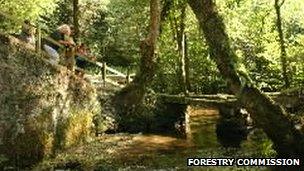Larch trees felled to slow Phytophthora ramorum virus
- Published

Some areas of Cardinham will be closed for public safety while felling takes place
Thousand of trees are to be felled to slow the spread of a disease which is destroying larch trees in Cornwall.
Phytophthora ramorum was first discovered in the UK in 2002 and identified in the South West two years ago.
About 11,000 infected Japanese larch trees will be felled to try to prevent the virus spreading from the foliage to other tree and plant species.
The infected trees are at Cardinham Woods, Dunmere Wood and East Wood.
The Forestry Commission has already felled affected larches in the Glyn Valley and at Idless Woods near Truro.
Footwear cleaning
John Ebsary, area forester for Cornwall, said it was disappointing to have to fell trees which had not yet reached full maturity.
"But the trees are dying from this highly destructive disease, and we have to try to contain it and prevent any further spread," he said.
Some areas of Cardinham will be closed to the public for safety reasons when felling takes place, but Mr Ebsary said disruption would be kept "to an absolute minimum".
Visitors to the woods have been asked to help minimise the spread of the disease by following signed bio-security instructions, which include washing footwear before leaving the area.
Because the pathogen can remain in the soil for several years, Mr Ebsary said most areas would either be left to regenerate naturally or replanted with different tree species not susceptible to phytophthora ramorum.
The felling should be completed by the end of March.
In Devon, work began earlier this month to cut down larch trees affected by the disease beside the A38 in Devon between Exeter and Plymouth.
- Published8 November 2011
- Published23 May 2011
- Published6 May 2011
- Published7 January 2011